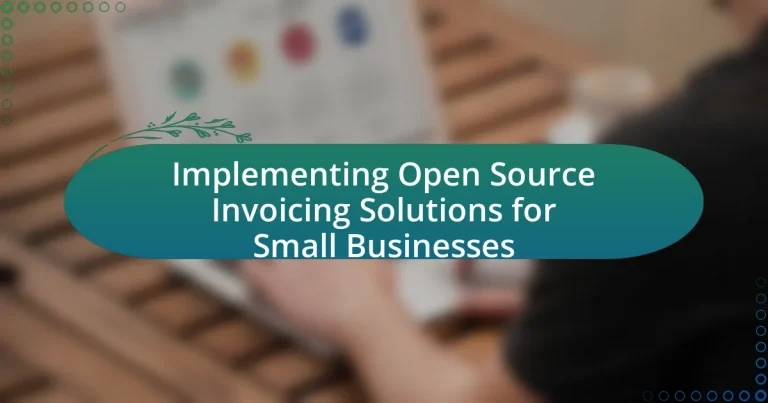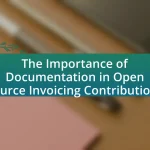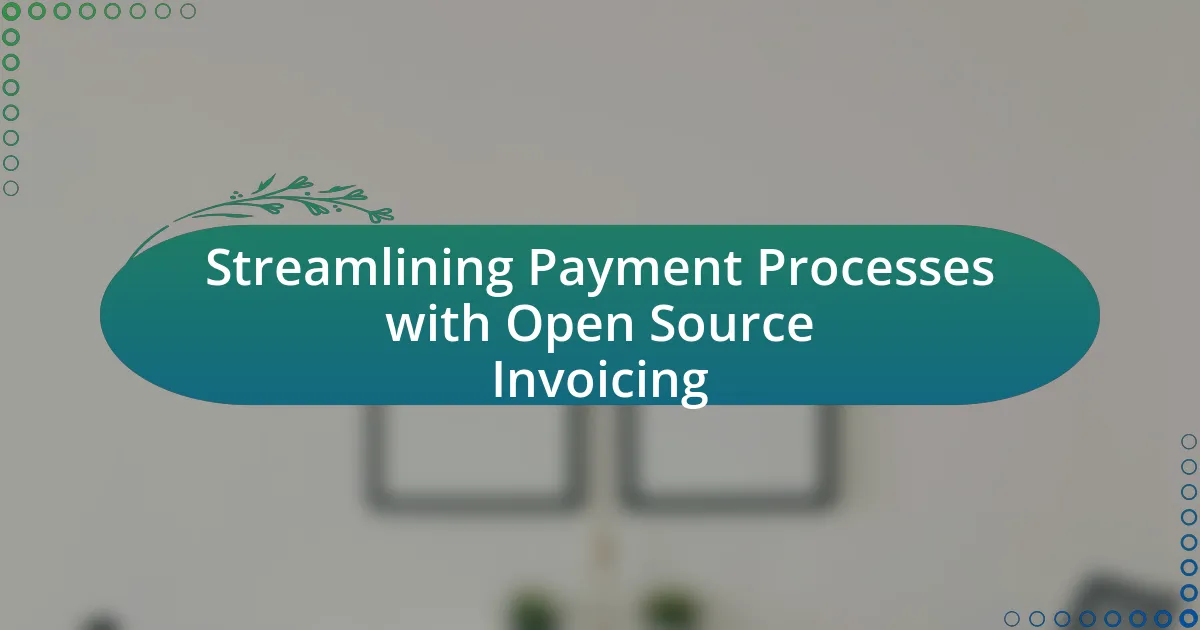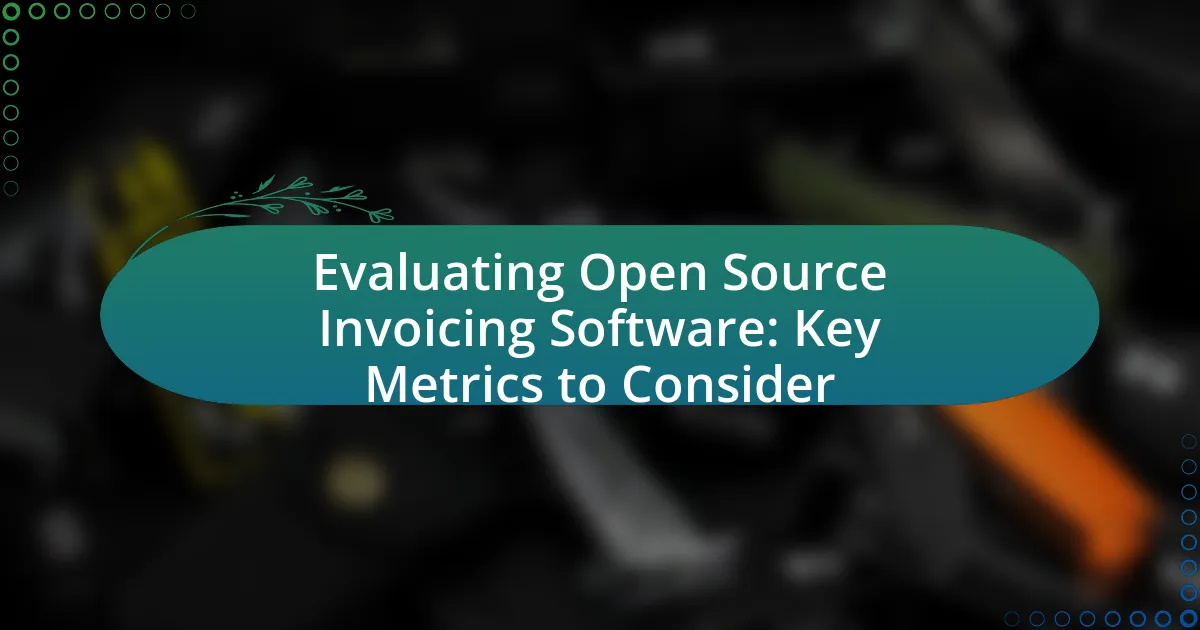Open Source Invoicing Solutions are software applications that enable users to create, manage, and send invoices without proprietary restrictions, allowing for customization and modification of the source code. This article explores the differences between open source and proprietary invoicing software, highlighting key features such as customizable templates, multi-currency support, and integration capabilities. It also discusses the cost savings and enhanced customization opportunities for small businesses, as well as the steps for implementation, technical requirements, and best practices for effective use. Additionally, the article addresses potential challenges in implementation and offers strategies for overcoming them, ensuring that small businesses can successfully adopt open source invoicing solutions.
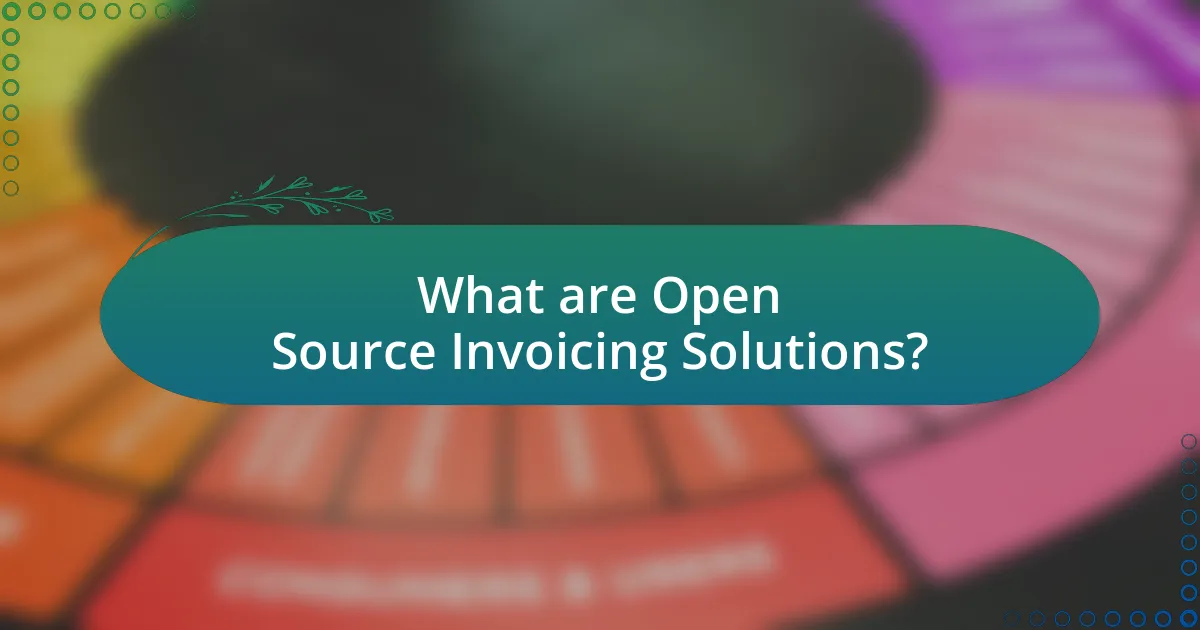
What are Open Source Invoicing Solutions?
Open Source Invoicing Solutions are software applications that allow users to create, manage, and send invoices without proprietary restrictions, enabling customization and modification of the source code. These solutions are typically free to use, fostering collaboration and community support, which can lead to continuous improvements and updates. For example, popular open source invoicing software like Invoice Ninja and Dolibarr provide features such as invoice generation, payment tracking, and client management, making them suitable for small businesses looking to streamline their billing processes.
How do Open Source Invoicing Solutions differ from proprietary software?
Open Source Invoicing Solutions differ from proprietary software primarily in terms of accessibility and customization. Open source solutions allow users to access and modify the source code, enabling tailored functionalities to meet specific business needs, while proprietary software restricts access to the source code, limiting customization options. For instance, according to a 2021 report by the Open Source Initiative, 78% of businesses using open source software cited flexibility as a key advantage, contrasting with proprietary software users who often face licensing fees and vendor lock-in, which can hinder adaptability.
What are the key features of Open Source Invoicing Solutions?
Open Source Invoicing Solutions typically feature customizable templates, multi-currency support, and integration capabilities with various accounting software. Customizable templates allow businesses to tailor invoices to their branding needs, enhancing professionalism. Multi-currency support is crucial for businesses operating internationally, enabling them to invoice clients in different currencies seamlessly. Integration capabilities with accounting software streamline financial management by automating data transfer and reducing manual entry errors. These features collectively enhance efficiency and adaptability for small businesses using open source invoicing solutions.
How does licensing affect the use of Open Source Invoicing Solutions?
Licensing significantly influences the use of Open Source Invoicing Solutions by dictating how the software can be used, modified, and distributed. Different open source licenses, such as the GNU General Public License (GPL) or the MIT License, impose varying restrictions and obligations on users. For instance, the GPL requires that any derivative work also be open source, which can limit how businesses integrate the software into proprietary systems. Conversely, the MIT License allows for more flexibility, enabling businesses to use the software in proprietary applications without such obligations. This variability in licensing affects small businesses’ decisions on which invoicing solutions to adopt, as they must consider compliance with these licenses to avoid legal issues.
Why should small businesses consider Open Source Invoicing Solutions?
Small businesses should consider Open Source Invoicing Solutions because they offer cost-effective, customizable, and flexible options for managing invoices. These solutions eliminate licensing fees associated with proprietary software, allowing small businesses to allocate resources more efficiently. Additionally, open-source software can be tailored to meet specific business needs, enhancing functionality and user experience. According to a 2021 report by the Open Source Initiative, 78% of businesses using open-source software reported improved operational efficiency, demonstrating the tangible benefits of adopting such solutions.
What cost savings can small businesses achieve with Open Source Invoicing Solutions?
Small businesses can achieve significant cost savings with Open Source Invoicing Solutions by eliminating licensing fees associated with proprietary software. These solutions are typically free to use, which allows businesses to allocate funds to other critical areas. Additionally, Open Source Invoicing Solutions often reduce operational costs through customizable features that can be tailored to specific business needs, minimizing the need for expensive third-party integrations or additional software purchases. According to a study by the Open Source Initiative, businesses utilizing Open Source software can save up to 80% on software costs compared to traditional proprietary solutions.
How do Open Source Invoicing Solutions enhance customization for small businesses?
Open Source Invoicing Solutions enhance customization for small businesses by allowing users to modify the software’s source code to meet specific operational needs. This flexibility enables small businesses to tailor features such as invoice templates, payment options, and reporting functionalities according to their unique requirements. For instance, a study by the Open Source Initiative highlights that 78% of small businesses using open-source software reported improved adaptability to their business processes, demonstrating the effectiveness of these solutions in fostering customization.
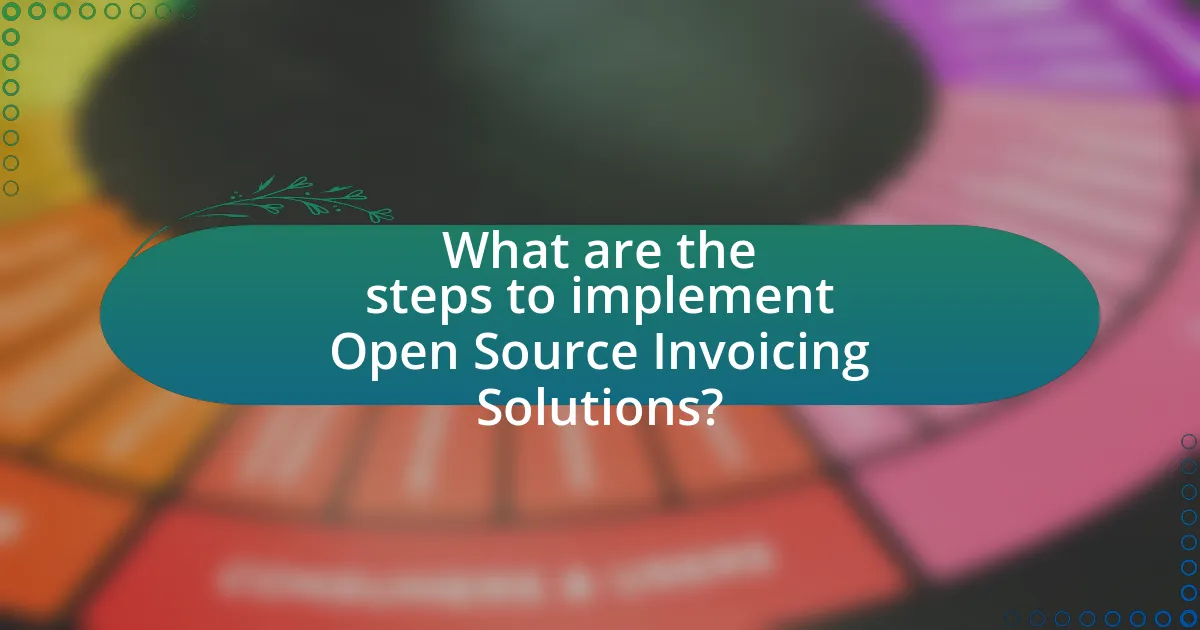
What are the steps to implement Open Source Invoicing Solutions?
To implement Open Source Invoicing Solutions, follow these steps: First, identify the specific needs of your business, such as invoicing features, user interface preferences, and integration capabilities. Next, research and select an appropriate open-source invoicing software that meets these requirements, such as Invoice Ninja or Dolibarr. After selecting the software, download and install it on your server or choose a cloud-hosted option if available. Then, configure the software settings, including company information, tax rates, and payment methods. Following configuration, customize invoice templates to align with your branding. Finally, conduct thorough testing to ensure functionality and accuracy before deploying the solution for actual invoicing. These steps ensure a tailored and effective implementation of open-source invoicing solutions for small businesses.
How can small businesses choose the right Open Source Invoicing Solution?
Small businesses can choose the right Open Source Invoicing Solution by evaluating their specific needs, assessing the features of various solutions, and considering community support and documentation. Identifying essential features such as customizable templates, multi-currency support, and integration capabilities with existing systems is crucial. For instance, solutions like Invoice Ninja and Dolibarr offer extensive features tailored for small businesses. Additionally, examining the level of community support and the availability of documentation can significantly impact the ease of implementation and troubleshooting. According to a survey by Open Source Initiative, 78% of users prioritize community support when selecting open-source software, highlighting its importance in the decision-making process.
What criteria should be considered when evaluating different solutions?
When evaluating different solutions for implementing open source invoicing systems for small businesses, key criteria include functionality, ease of use, community support, customization options, and cost. Functionality refers to the features necessary for invoicing, such as billing, reporting, and payment processing. Ease of use ensures that the software can be navigated without extensive training, which is crucial for small business owners with limited time. Community support is vital as it provides access to resources, troubleshooting, and updates, enhancing the software’s reliability. Customization options allow businesses to tailor the solution to their specific needs, which can improve efficiency. Lastly, cost is a significant factor, as small businesses often operate on tight budgets; thus, understanding the total cost of ownership, including potential hidden costs, is essential. These criteria collectively help ensure that the chosen solution aligns with the operational needs and financial constraints of small businesses.
How can user reviews and community support influence the decision?
User reviews and community support significantly influence the decision to implement open source invoicing solutions for small businesses by providing real-world insights and validation of the software’s effectiveness. Positive user reviews can enhance trust and credibility, as they often highlight successful use cases and features that meet specific business needs. For instance, a study by BrightLocal found that 91% of consumers read online reviews, and 84% trust them as much as personal recommendations, indicating that potential users are likely to consider the experiences of others when making decisions. Additionally, community support, such as forums and user groups, offers ongoing assistance and shared knowledge, which can alleviate concerns about adopting new technology. This collaborative environment fosters confidence in the solution’s reliability and usability, further influencing the decision-making process.
What are the technical requirements for implementing Open Source Invoicing Solutions?
The technical requirements for implementing Open Source Invoicing Solutions include a compatible server environment, database management system, and programming language support. Specifically, a web server such as Apache or Nginx is necessary to host the application, while a database like MySQL or PostgreSQL is required for data storage. Additionally, the solution typically needs to be developed in languages such as PHP, Python, or Ruby, depending on the specific software chosen. These requirements ensure that the invoicing solution operates efficiently and securely, allowing small businesses to manage their invoicing processes effectively.
What hardware and software specifications are needed?
To implement open source invoicing solutions for small businesses, the required hardware specifications typically include a computer with at least a dual-core processor, 4GB of RAM, and 500GB of storage. These specifications ensure that the software runs efficiently and can handle multiple transactions simultaneously.
On the software side, a compatible operating system such as Windows, macOS, or a Linux distribution is necessary, along with a web browser for accessing cloud-based solutions. Additionally, specific open source invoicing software, such as Invoice Ninja or Dolibarr, must be installed, which may require PHP, MySQL, and a web server like Apache or Nginx for optimal performance. These software requirements are essential for ensuring that the invoicing solution functions correctly and securely.
How can small businesses prepare their IT infrastructure for implementation?
Small businesses can prepare their IT infrastructure for implementation by assessing their current systems, ensuring compatibility with open source invoicing solutions, and investing in necessary hardware and software upgrades. Conducting a thorough evaluation of existing IT resources helps identify gaps and areas for improvement, which is crucial for seamless integration. Additionally, ensuring that the network infrastructure can support the new software, including adequate bandwidth and security measures, is essential. According to a report by the Small Business Administration, 70% of small businesses that invest in technology see improved efficiency and productivity, highlighting the importance of proper IT preparation for successful implementation.

What challenges might small businesses face when implementing Open Source Invoicing Solutions?
Small businesses may face several challenges when implementing Open Source Invoicing Solutions, including technical expertise, integration issues, and ongoing maintenance requirements. The lack of in-house technical skills can hinder effective deployment and customization of these solutions, as many open-source platforms require a certain level of programming knowledge. Additionally, integrating open-source invoicing software with existing systems, such as accounting or inventory management, can be complex and time-consuming, potentially leading to data inconsistencies. Furthermore, ongoing maintenance and support can be a challenge, as small businesses may not have the resources to manage updates or troubleshoot issues without dedicated IT staff. These factors can ultimately affect the efficiency and reliability of invoicing processes for small businesses.
How can small businesses overcome common implementation challenges?
Small businesses can overcome common implementation challenges by adopting a structured approach that includes thorough planning, training, and leveraging community support. A well-defined implementation plan that outlines specific goals, timelines, and resource allocation helps mitigate risks associated with open source invoicing solutions. Training employees on the new system ensures they are equipped to use it effectively, which can lead to higher adoption rates and fewer operational disruptions. Additionally, engaging with the open source community provides access to valuable resources, including documentation, forums, and expert advice, which can assist in troubleshooting and optimizing the invoicing solution. These strategies collectively enhance the likelihood of successful implementation and operational efficiency.
What training resources are available for staff on Open Source Invoicing Solutions?
Training resources available for staff on Open Source Invoicing Solutions include online courses, documentation, community forums, and webinars. Online platforms such as Coursera and Udemy offer structured courses specifically focused on open source invoicing software like Invoice Ninja and Odoo. Comprehensive documentation is provided by the software developers, detailing installation, configuration, and usage. Community forums, such as those on GitHub or Stack Overflow, allow staff to engage with other users for troubleshooting and best practices. Additionally, webinars hosted by industry experts provide insights and practical demonstrations, enhancing staff understanding and proficiency in using these solutions.
How can businesses ensure data security during implementation?
Businesses can ensure data security during implementation by adopting a comprehensive security framework that includes encryption, access controls, and regular security audits. Implementing encryption protects sensitive data both in transit and at rest, making it unreadable to unauthorized users. Access controls limit data access to authorized personnel only, reducing the risk of data breaches. Regular security audits help identify vulnerabilities and ensure compliance with security policies. According to a 2021 report by the Ponemon Institute, organizations that implement strong data security measures can reduce the risk of data breaches by up to 50%.
What ongoing maintenance is required for Open Source Invoicing Solutions?
Ongoing maintenance for Open Source Invoicing Solutions includes regular software updates, security patches, and data backups. Regular software updates ensure that the invoicing solution remains compatible with other systems and incorporates new features, while security patches protect against vulnerabilities that could be exploited by malicious actors. Data backups are essential to prevent loss of financial information, ensuring that all invoices and transaction records are securely stored and retrievable in case of system failure. According to a 2021 survey by the Ponemon Institute, 60% of small businesses that experience a data breach go out of business within six months, highlighting the critical nature of these maintenance tasks.
How can small businesses keep their invoicing software updated?
Small businesses can keep their invoicing software updated by regularly checking for software updates and applying them promptly. This practice ensures that the software benefits from the latest features, security patches, and bug fixes, which are crucial for maintaining operational efficiency and data security. According to a report by the Cybersecurity & Infrastructure Security Agency, 60% of data breaches are linked to unpatched software vulnerabilities, highlighting the importance of timely updates. Additionally, small businesses should subscribe to the software provider’s newsletters or notifications to stay informed about new releases and updates.
What support options are available for troubleshooting issues?
Support options for troubleshooting issues with open source invoicing solutions include community forums, documentation, and professional support services. Community forums provide a platform for users to share experiences and solutions, while comprehensive documentation offers step-by-step guides and troubleshooting tips. Additionally, professional support services can be contracted for more complex issues, ensuring expert assistance is available when needed. These support avenues are essential for effectively resolving problems and enhancing user experience with open source software.
What best practices should small businesses follow when using Open Source Invoicing Solutions?
Small businesses should prioritize security, customization, and community support when using Open Source Invoicing Solutions. Ensuring robust security measures, such as regular updates and secure configurations, protects sensitive financial data. Customization allows businesses to tailor the invoicing solution to their specific needs, enhancing usability and efficiency. Engaging with the community for support can provide valuable insights and troubleshooting assistance, as many open-source projects have active forums and user groups. According to a 2021 survey by Open Source Initiative, 78% of businesses reported improved flexibility and cost savings when utilizing open-source software, reinforcing the importance of these best practices.
How can small businesses effectively manage invoicing processes?
Small businesses can effectively manage invoicing processes by utilizing open source invoicing solutions that automate and streamline billing tasks. These solutions allow for customizable invoice templates, automated reminders for overdue payments, and integration with accounting software, which enhances accuracy and reduces manual errors. According to a study by the Small Business Administration, businesses that automate invoicing can reduce processing time by up to 50%, leading to improved cash flow and operational efficiency. By adopting these tools, small businesses can ensure timely invoicing, maintain better financial records, and ultimately enhance customer satisfaction.
What tips can enhance the user experience with Open Source Invoicing Solutions?
To enhance the user experience with Open Source Invoicing Solutions, prioritize user-friendly interfaces and customization options. A user-friendly interface simplifies navigation and reduces the learning curve, making it easier for small business owners to manage invoices efficiently. Customization options allow users to tailor the solution to their specific needs, such as branding invoices with logos and adjusting layouts. Research indicates that 70% of users prefer software that can be personalized to fit their workflow, which directly correlates with increased satisfaction and productivity. Additionally, providing comprehensive documentation and community support can further improve user experience by enabling users to resolve issues quickly and learn best practices.
